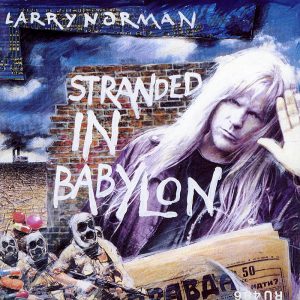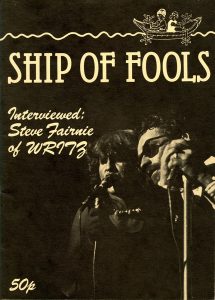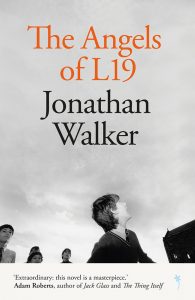Writer and poet Rupert Loydell looks back to the collaborations and collisions between church culture and the wider culture in the 1970s and 80s, with a cast including Jesus Rock Music, the Greenbelt festival, Mary Whitehouse and musicians such as Larry Norman and Steve Fairnie of Writz.
I’ve been sitting in this garden
In the middle of my days
And my memories fade and harden as the years they slip away
I’ve been looking in the mirror
At the age around my eyes
Time is such an earnest labourer, precision is his neighbour
Lay my body in the ground but let my spirit touch the sky
Larry Norman, ‘I Hope I’ll See You In Heaven’
Nowadays, we live in a world where – post U2, born-again Dylan, Van Morrison, Bruce Cockburn, and many others – spirituality and belief are part of everyday discourse. However, with the rise of the Christian right, it also seems timely to reconsider the fading influence of mainstream churches post-war in the 20th century, when Christianity was still thought to underpin and inform society, and we did not know terms such as jihad or religious extremism as we do now. For a while in the 70s and 80s, more liberal churches valiantly found ways to introduce contemporary hymns and new translations of the Bible to their congregations, and spawned a copycat subculture of Jesus Rock music, t-shirts and stickers; but in the end the UK would become a secular society.
As part of my research as a university lecturer, I’ve been writing about Christian music for the journal Punk & Post-Punk. I’m fascinated by the way the story of Christians and music in the UK diverges from the USA, where Jesus Rock spawned the multi-million dollar Christian Contemporay Music (CCM) scene. Over here, despite several companies’ attempts, CCM was not a success, although it quickly adapted by reinventing itself mostly as a place for praise and worship music.

So far I’ve written about how visits from American musicians such as Larry Norman and Liberation Suite seemed to inspire a move away from coffee bar evangelism and its associated singer-songwriters into pop and rock; and then about the period when bands such as After the Fire and Fish Co./Writz (pictured above) chose to situate themselves in the mainstream, preceding the likes of U2 in writing about faith and doubt in relation to the world about them.
I’ve also interviewed the Revolutionary Army of the Infant Jesus, reviewed an (appalling) American academic book about U2, have an interview with musician and music executive Nick Battle currently submitted, and am working with musician, producer and film-maker Steve Taylor on a new piece which will be more about later American CCM. Obviously, I have drawn on and quoted from books and contemporaneous sources about Christian/Jesus Rock, and talked to other writers and musicians such as Steve Turner, Steve Scott and Peter Banks.
I saw both Norman and Liberation Suite in the 70s, along with acts such as Malcolm & Alwyn and Parchment; I think I even saw Cliff Richard live once, although the event was perhaps more memorable (and shocking at the time) because of the way the support act Second Chapter of Acts seemed to think they were dealing with a crowd of drug-taking delinquents who lived in a world of knife crime and backstreet abortions. The church youth groups present did not live there.
I was also aware of American music made by the likes of Barry McGuire, Love Song and Randy Matthews; and our church hosted a band I only found out years later were Out of Darkness. Their hard rock was so loud that they pretty much cleared the hall we’d worked hard to fill with young people from the suburbs we lived in! Our Baptist minister and the church deacons were not amused, though several of us enjoyed the gig. It wasn’t long though before I found myself at Greenbelt Festival, where I performed poetry and sold books on the fringe, and at gigs in London with After the Fire and Writz.
I knew early on that in a battle between church and music, music was always going to win for me. Hymn sandwiches and mundane Bible study were no match for the bars, dark corners and excitement of the Marquee, Lyceum or Music Machine. The freedom of discussion and dispute at Greenbelt, as well as the bands playing on the fringe stage – be they punk, experimental, noise or synthesized (rumour has it early Depeche Mode even played there once) – was no match for Sunday best and denominational differences and rules.

When I went to art college in the early 80s, Greenbelt became what Steve Fairnie, Writz’s front man, with whom I ended up on the Greenbelt fine art committee, called ‘a telephone church’. In a way he foresaw what the internet would later make the norm: like-minded groups linked by interests and aims, who only met occasionally but kept in touch to organise and discuss. And of course, all the small groups came together each August Bank Holiday for the festival itself.
I liked the fact that Greenbelt hosted visitors from other faiths or non-faiths, that it invited bands who weren’t specifically Christian but wrote about spirituality and belief, that it refused to feel threatened by others who doubted or believed differently. Greenbelt at the time was a safe space for experiment, argument and risk-taking. This wasn’t of course, a popular course of action: I’ve seen an art exhibition I helped curate and hang picketed because some of the paintings contained male nudes, and personally been abused for selling ‘secular’ poetry books.
My perception is that Greenbelt was attacked by part of the mainstream and conservative church, who refused to endorse their youth groups visiting, which was part of the reason the festival repositioned itself as an event exploring social justice and liturgy as well as the arts. Elsewhere, even the friendly editors of Ship of Fools gave Steve Fairnie a hard time in interview because he wanted to entertain audiences, not preach to them. No wonder at the time I didn’t go to church.
Several years later I realised – mostly thanks to friends in a Scottish band – that like it or not, Christians are part of the church, even when not part of a specific church. I found myself attending a welcoming and open-minded high Anglican church in Exeter, enjoying the liturgy and getting to know people of all ages, from toddlers to OAPs. Their attitude was ‘this is what we do, how we worship; you are welcome’. Of course, in a city, other churches were available. By then, the theological and social arguments about Christians in the arts seemed done and dusted, and there was little visible CCM or Christian arts subculture visible (to me, anyway) in the UK.
I was quite shocked therefore, when I exhibited and spoke at the Cornerstone Festival in America. The tattooed and leather-clad Christians in attendance turned out to be legalistic and evangelistic. They didn’t like the fact that the British group I was in had ordered drinks when we arrived at the motel after our long journey, didn’t understand how you could listen to music that wasn’t explicitly Christian, how you could disagree with something but not censor or condemn it, or why you would make art, music or poetry that didn’t witness. Even the indie record labels present in the market there mostly aspired to be part of CCM.
I was reminded how cheated I’d felt in retrospect by the Festival of Light and Festival of Jesus events in London, which I had attended as a pre-adolescent; how the likes of Mary Whitehouse had used Christianity as a disguise for calls for censorship and right-wing moralistic restrictions. (Later, I felt the same about the book U2 and the Religious Impulse, where American academics try to shoehorn U2 into evangelical restraints. In my review I suggested that the book should have been called American Academics and their Desire for U2 to be a Christian Band.)

In general, UK churches seemed unable to accommodate the rise of youth culture. Strict, evangelical denominations rooted in a literal belief in the Bible, and intent on ‘keeping themselves pure’ by remaining separate from the world around them, particularly struggled. Jonathan Walker’s 2021 novel The Angels of L19 (Weatherglass Books) is set in one such church, situated in Liverpool in the 1980s. In interviews, the author has made it clear that much of the book is rooted in autobiography. The vocabulary, listening habits, politics, jokes and dress sense (or lack of!) are spot-on, and clearly not a product of research: this is lived-in writing.
But this socio-realist novel is laid over with a supernatural element: the church members’ literal beliefs and interpretations of ‘The Word’ allow Robert’s mental illness and delusion a free rein, with disastrous consequences. The Angels of L19 is creepy and disturbing, although it never becomes too gruesome or ultraviolent; neither does it judge or comment, preferring to let readers decide what is real, what is right, and what to make of this strange and unsettling scenario set in recent history.
I don’t see or believe in literal angels or demons, and I remain full of doubt as much as belief. I’m sceptical of happy-clappy churches, witness and evangelical diatribe, but Walker’s book got me thinking about my Christian upbringing. The tangles of tradition and rebellion, orthodoxy and non-conformism, communion wine and beer. Youth group Bible studies versus youth group or school parties, pre-marital sex versus snogging, the secular versus the sacred, church versus society, forgiveness versus punishment, legalism versus love, us versus them.
It all seems a long time ago now and somewhat irrelevant; gender and identity politics, sexuality, global warming and social media are more of an issue these days, and what Christians can or can’t do probably seems irrelevant, particularly when it comes to music and the arts. To quote and mis-apply Charles Dickens in A Tale of Two Cities (he was actually writing about 19th century society): ‘It was the best of times, it was the worst of times, it was the age of wisdom, it was the age of foolishness, it was the epoch of belief, it was the epoch of incredulity, it was the season of light, it was the season of darkness…’ I’m glad I was there.
For Martin Caseley, Anthony Wilson and Paul Platt; and in memory of Steve Fairnie, Larry Norman and John Peck.
Part of this article appeared as a book review of The Angels of L19, published by International Times in December 2021.
Rupert Loydell is senior lecturer in the School of Writing and Journalism at Falmouth University. He is the editor of Stride magazine, and contributing editor to International Times. A widely published poet, his most recent poetry books are Dear Mary (2017) and A Confusion of Marys (with Sarah Cave, 2020).
Image of Larry Norman album: Brett Jordan / CC BY 2.0



